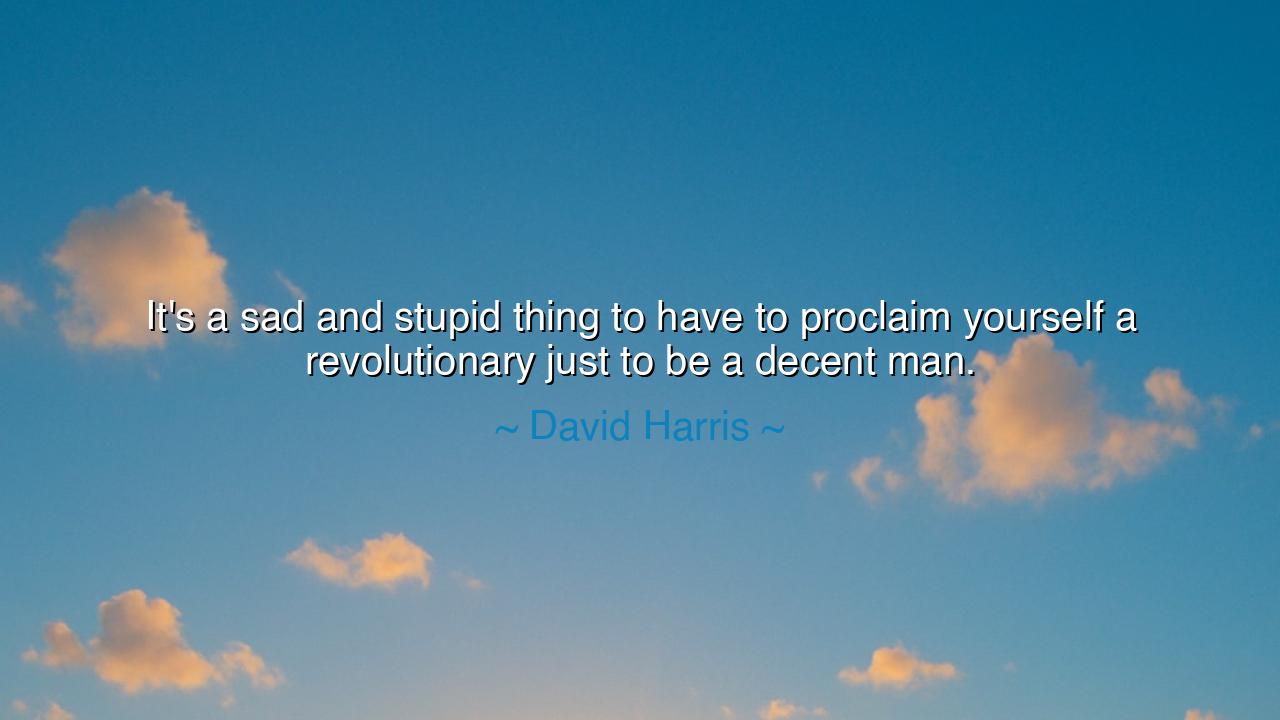
It's a sad and stupid thing to have to proclaim yourself a
It's a sad and stupid thing to have to proclaim yourself a revolutionary just to be a decent man.






David Harris, a voice of conscience in troubled times, once declared: “It’s a sad and stupid thing to have to proclaim yourself a revolutionary just to be a decent man.” These words cut through the illusions of politics and society to reveal a deeper tragedy: that when the world has strayed too far from justice, even simple goodness appears radical, and to live as an honest man becomes an act of rebellion.
The heart of this saying lies in the contrast between decency and revolution. In a healthy world, to be decent—to speak truth, to act with compassion, to resist cruelty—should be the natural state of all. Yet Harris laments that society has fallen so low that decency itself is treated as defiance. Thus, the revolutionary is not one who seeks chaos, but often simply one who refuses to bow to corruption. The tragedy is not in the courage of the man, but in the sickness of the age that demands courage for the most basic virtue.
History has borne witness to this sorrow many times. Consider the prophet Amos in ancient Israel, who cried out against oppression of the poor. He was no soldier, no rebel—yet his insistence on justice branded him a troublemaker, a radical. Or think of Rosa Parks in Montgomery, Alabama. She did not storm barricades; she merely sat upon a bus seat. Yet that small act of decency was treated as revolutionary, because the world around her had made injustice its law. These stories illuminate Harris’s truth: when the times are corrupted, goodness itself is rebellion.
The words also carry a tone of weariness. To call it sad and stupid is to name the absurdity of such a world, where labels like “radical” or “agitator” are hurled at those who simply refuse to be cruel. It is sad, because this betrays the state of a society unable to recognize virtue as normal. It is stupid, because it condemns what it most desperately needs—men and women who dare to live with integrity. Harris’s voice here is both bitter and instructive: bitterness at the foolishness of his time, instruction for generations to come.
The deeper meaning, then, is that a just society is one where decency is not the exception but the rule. When honesty, compassion, and courage are treated as acts of rebellion, it is a sign that the world is inverted. Yet within this inversion lies a seed of hope—for if even ordinary decency shakes the foundations of injustice, then the path to revolution may not lie in violence, but in the daily courage of individuals living truthfully.
The lesson for us is this: strive to make your life decent, and accept if that decency is seen as defiance. Do not shrink from being called a revolutionary, if all you have done is stand for truth. But let your heart mourn the world that requires such courage for such simplicity. And let your works, whether small or great, labor toward a future where integrity is no longer rebellion but the air all men breathe.
Practically, this means speaking against cruelty even in small circles, treating others with dignity even when the culture of the day devalues them, and refusing to normalize corruption. It means raising children to see decency not as a brave act, but as the natural measure of humanity. And it means honoring those who came before us—prophets, saints, poets, and martyrs—who bore the burden of being called radicals when all they sought was justice.
Thus, David Harris’s words ring like a warning bell across the ages: when the world despises the decent man, it forces him into the cloak of the revolutionary. May we work toward a time when such a cloak is no longer needed—when truth, kindness, and justice are no longer rebellion, but simply the way of being human.






AAdministratorAdministrator
Welcome, honored guests. Please leave a comment, we will respond soon